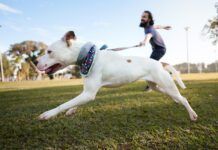Trainers are fond of saying that we train our dogs every day, whether or not we realize it. What they mean is, our dogs pay scrupulous attention to our behavior (even when it seems that they are ignoring us) so they can put themselves in a good position to profit from their association with us. If we are doing something that has potential benefits for them, they tend to tag along and turn on the charm; if we engage in activities that are distinctly unrewarding to them, they usually take a pass.
288
This is why your dog is more likely to follow you into the kitchen than, say, into the bathroom. Your presence in one room reliably predicts the appearance of food, and sometimes he gets some of it! Your presence in the other room, though, is a total bore – and sometimes it predicts a dog bath! Heading for the living room? Well, it depends. It’s one thing if it’s nighttime and you’re carrying a bowl of popcorn. It’s another thing entirely if it’s midday and you’re dragging a vacuum. One situation is promising for a dog and one is not. It’s not rocket science; it’s simple observation and deduction.
I’ve been trying to explain this concept to my husband, who sometimes becomes frustrated with our dog, Otto. Brian has certain expectations of dogs in general, and one is that they should be happy – nay, eager – to jump in the back of a truck at any time. Some dogs relish the opportunity to take a drive with their owners, even if it’s just to the post office and back. But Otto does not enjoy riding in automobiles of any kind. In the car, he curls himself into a ball on the floor of the backseat and lies there looking glum until we arrive at our destination. In the truck, he lies down behind the cab and doesn’t get up until we turn off the engine. As a result, Otto’s willingness to get in the car or truck is completely conditional.
For example, the presence of a bait bag full of treats at night almost always means we’re going to a dog-training class, which he enjoys immensely. When I head to the truck wearing my hiking shoes or bike shorts, a fun run for Otto often follows, and so at these times, Otto will jump right in.
Other things predict Otto’s discomfort. The appearance of Brian’s fishing rod has often translated into a very long drive on bumpy, winding roads, and/or hours of lying tied up on a cold riverbank. That math is just not that difficult to do, even for a dog.
But at other times the problem is positively algebraic. Nancy + hiking shoes + treats sometimes = a trip to the vet. And once, Brian was alone (this often means fishing) but didn’t have the fishing rod with him. That turned out to be a trick question; Brian snapped Otto’s harness onto the safety belt and then went to get the fishing rod. In other words, we’ve unwittingly trained Otto to be wary of the car and truck.
Think about what you might be doing to reinforce your dog’s undesirable behavior, and what you could do to reward him for the behavior you want.





